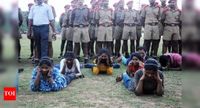As India prepares for a nationwide civil defence mock drill on May 7, 2025, memories of the 1971 Indo-Pak war are being revived, highlighting the country’s ongoing tensions with Pakistan. The drills, which will take place across all states and Union Territories, aim to ready civilians and local administrations for potential emergency situations amidst escalating geopolitical threats.
The decision to conduct these mock drills comes in the wake of the recent Pahalgam terror attack, which has heightened security concerns and prompted the government to enhance civilian preparedness. This exercise marks the largest of its kind since the 1971 war, which saw a significant mobilization of both military and civilian resources.
For many, the upcoming drills bring back vivid recollections of the wartime atmosphere from over five decades ago. Journalist Sinha recalls, “I was in college back then and we would hear sirens go off at 7 pm. This meant that we now had to turn the lights off,” highlighting the immediate sense of danger felt by the public. Announcements were made on All India Radio’s Patna Centre, instructing people to turn off lights as part of the blackout drills that were commonplace during that period.
These drills began just days before the war broke out in early December 1971 and continued until December 16, when Pakistan’s Lieutenant General A. A. K. Niazi surrendered to Indian forces in Dhaka. The sense of urgency was palpable, as entire cities retreated indoors by 6:30 pm, creating an eerie yet organized atmosphere. “It was a mixed experience of fear and excitement,” said Sinha, reflecting on the community's shared resilience during those trying times.
In Kanpur, Mousumi Roy, then just three years old, grew up hearing her mother’s stories about the potential targeting of the city to cripple India’s economy. “There were conversations that Kanpur would be hit so they can take down India’s economy,” she recalled. Notably, the iconic Taj Mahal was also shrouded in black cloth during the 1971 war, a precaution that had been taken previously during World War II and the 1965 conflict. “Back then there was no high-precision GPS or satellite imagery, so covering the Taj Mahal with black cloth would make the bomber plane look at it like nothing but a bamboo stockpile,” Roy explained.
As the country readies itself for the upcoming drills, the echoes of the past serve as a reminder of the importance of preparedness. In Odisha, families are already feeling the impact of the renewed uncertainty, with many cancelling their summer vacation plans. Shantilata Rath, 62, from Bargarh, reminisced about the days when families would stay glued to the radio, eagerly awaiting the sound of sirens that signaled the need to retreat indoors. “It was frightening but also strangely uniting,” she noted.
Syed Maqbool Ali, a college student during the 1971 war, shared similar sentiments, recalling how lights were switched off at night as a precaution. “Even the upper part of headlights of vehicles was painted black,” he said, noting that many in Odisha did not take the threat seriously due to their distance from the border. However, the tension was undeniably present, with a palpable “war buzz” in the air.
In Balasore, retired Air Force officer Manoj Das, a Kargil war veteran, has taken on the responsibility of educating villagers about basic safety measures and emergency protocols. “People often think these things won't affect them. But being prepared is better than being caught off-guard,” he advised, emphasizing the importance of community readiness.
The upcoming mock drills will include simulated sirens, blackout procedures, and emergency response mechanisms for civilians. Travel agencies have reported a sharp rise in cancellations of holiday bookings, as safety concerns loom large. “Many families have dropped their plans for trips to hill stations and other places, citing safety concerns and the looming uncertainty,” said Arpit Swain, a city-based travel agent. Samarjit Mohanty, an IT professional, cancelled his trip to Uttarakhand, stating, “The situation is very volatile. In an emergency situation, it will be very difficult to travel.”
As preparations continue, the drills are set to involve air raid sirens, instructing participants to lie flat on the ground and cover their ears, mimicking emergency reactions during aerial bombings. A second siren will indicate that it is safe to begin simulated rescue operations, where participants will assist ‘injured’ civilians.
In West Bengal, the state is gearing up for large-scale civil defence drills at over 100 locations, including at least 20 sites in Kolkata. The drills aim to assess the civilian setup's readiness in case of an enemy attack, with participation from thousands of volunteers, security personnel, and emergency response agencies. The Bansdroni area has been designated as the central command hub for civil defence activities in Kolkata, with over 1,500 police personnel and around 59,000 trained volunteers expected to take part.
Officials have noted that the drills will not only focus on immediate responses to threats but also on long-term preparedness. “We are trying to fill all infrastructural gaps and procure necessary equipment within a week,” stated a senior government official, indicating that this will be an extended and thorough drill, not just a one-day event.
In light of the recent tensions, the Centre has emphasized the need for heightened readiness, particularly in border states like West Bengal, which has been identified as highly sensitive due to its proximity to conflict zones. Seventeen districts in Bengal have been earmarked for special focus, including areas housing Army installations and oil facilities.
The forthcoming mock drills serve as a crucial reminder of the past and a preparation for the future, as India navigates the complexities of modern threats while ensuring the safety and security of its citizens.





